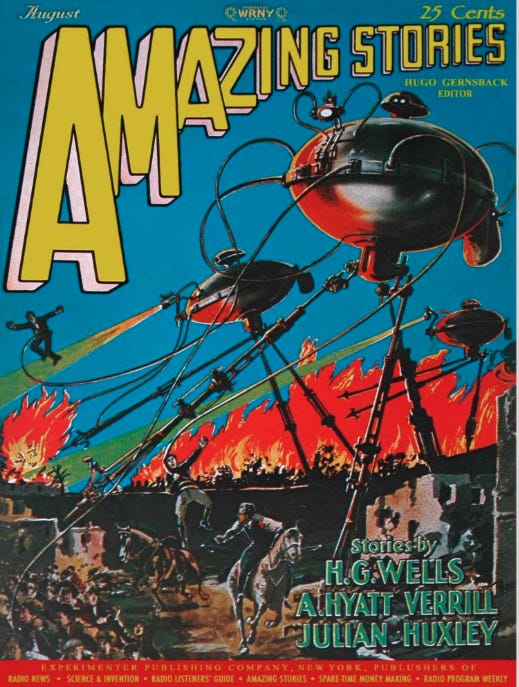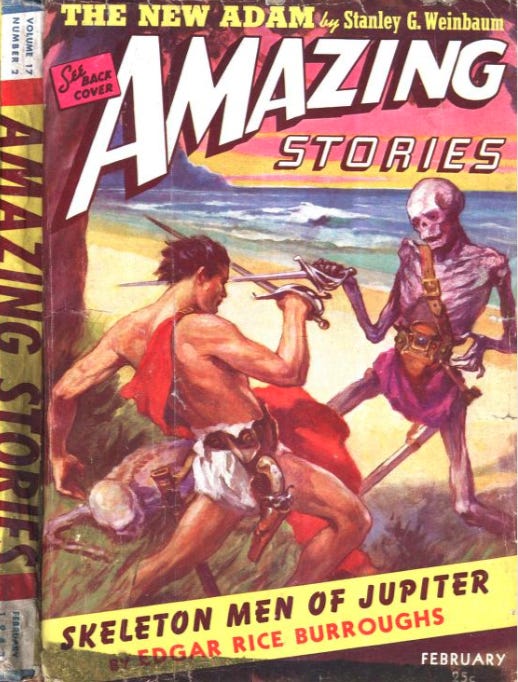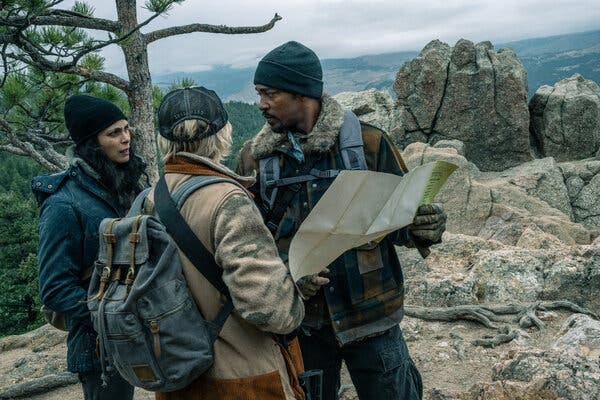Rocky Mountain High Alien Invasion
A Discussion of Elevation (2025)
Yet across the gulf of space, minds that are to our minds as ours are to those of the beasts that perish, intellects vast and cool and unsympathetic, regarded this earth with envious eyes, and slowly and surely drew their plans against us. And early in the twentieth century came the great disillusionment.
— The War of the Worlds by H.G. Wells (1898)
Brief Background on the Alien Invasion Genre
With his classic novel The War of the Worlds, Herbert George Wells created an enduring structure for countless science fiction narratives about invasion, conquest, and resistance. We are all familiar with the story. Aliens from Mars look upon the Earth with envious eyes. They invade our planet with overwhelming force and devastate the most powerful armies on the planet, but they have a weakness and are defeated by “the humblest things that God, in his wisdom, has put upon this Earth.”
In some ways Herodotus’ portrayal of Thermopylae, Salamis, and Plataea in Books VI to IX of his Histories provides the basic structure for any and all future invasion stories. It typically begins with the incursion of an invading force of almost unimaginable power that crushes or assimilates all who attempt to resist it (Emperor Xerxes, with “1 million soldiers,” and his Immortals). Defeat seems inevitable and the world as we know it will likely cease to exist. In response to this a scrappy band of adventurers (Sparta’s 300)1. Sadly, this scrappy force fails in their mission, though they may have discovered some new information that survivors can share.
Eventually, there is a victory or circumstance that reveals a potential weakness of the enemy. In Herodotus’ telling, the Battle of Artemisium fits this slot. The battle itself was indecisive, but it revealed tactical and technological weaknesses in the Persian fleet. It’s also interesting that Herodotus paints what success there was a storm (an act of the Gods?) that aided the Greeks here.2 This minor success allows the defenders to fight the battle that turns the tide, in this case the Battle of Salamis. Finally, the defenders achieve glorious victory as the Greeks did in Plataea.
Herodotus was describing, with a bit of narrative flair, a real war, but his writing has provided the frame work for the entire field of science fiction invasion stories. One of the most famous, and in my mind the first, of these was H.G. Wells’ The War of the Worlds. You can see Herodotus’ model in the book, but later writers become even more explicit in the narrative pattern. Edgar Rice Burroughs’ followed this pattern in his book The Moon Maid as well as his later John Carter story Skeleton Men of Mars, Heinlein’s Starship Troopers roughly follows the outline, and Orson Scott Card’s Ender’s Game uses it but includes a mournful deconstructive ending. The pinnacle of the pattern in literary form is in Larry Niven and Jerry Pournelle’s book Footfall.
There are, of course, numerous films that follow the pattern that range from Day of the Triffids and The Puppet Masters, both based on novels of the same name, fit the bill nicely as does Independence Day. The whole, we can “give the aliens a virus” thing is both a Herodotean discovery of weakness and a direct reference to Wells’ “little organisms.” The original V series had this pattern, plus a little human complicity, at its core and Falling Skies pulled pages from both John Christopher’s Tripods series and Footfall. The connection to Footfall was especially apparent when Noah Wylie’s History Professor character Tom Mason gave his speech on American tenacity and our ability to engage in partisan warfare, a model that Mao applied actively in his book On Protracted War.
Whew. That’s a lot of information and it barely scratches the surface on the genre, but I wanted to provide a brief overview to contextualize my review of Elevation within a literary and artistic tradition. Rather than to say it is “derivative” or A Quiet Place rip off, I wanted to place it and A Quiet Place within a genre tradition that includes all those and even Live Die Repeat. It’s more than a mere trope, it’s a full genre and what matters isn’t that you conform to underlying and predictable genre structures. What matters is how and why you vary the formula to engage with new ideas. Heinlein’s The Puppet Masters and Starship Troopers both contained commentary on Communism, as did Burroughs’ The Moon Maid, and Starship Troopers provides a “working model” for the kind of democracy he wrote about in his book Take Back Your Government. Ender’s Game has a critique of war and how it leads us to dehumanize the enemy.
And this brings us to the point of this article, is Elevation worth watching and what does it have to say?
Is it High Time to See Elevation
There can be no doubt that the Covid-19 Pandemic had a significant impact on the films we see being produced. Sometimes the connection is very much on the nose, at other times it’s in the little details or commentary. George Nolfi’s recent film Elevation is no exception and it’s the film’s particular Covid-19 underpinnings that give it some distinctive qualities when compared to other recent alien invasion/pandemic stories.
A lot of reviewers have focused on the fact that Elevation is the latest in what seems to be a series of “Humans fighting aliens who have a special way of detecting/attacking people” films. In all of these films, the aliens are nigh invulnerable to firearms and other weapons that could be used against them easily and quickly take over the planet. The trend started around 2018 with films like A Quiet Place where the aliens used our particular sounds to hunt us. In the case of Elevation, the aliens (Reapers) can track our particular CO2 signatures to distinguish us from other animals but cannot hunt us at altitudes higher than 8,000 feet3
In most of these films society has broken down and the protagonists go searching to see if there is any kind of civilization and refuge to be found. This draws straight from The Day of the Triffids’ playbook, a playbook that is used frequently in zombie films as well. The invasion has not only resulted in a “victory” for the alien forces, but it has revealed the tenuous connections between people and how fragile society is when put to the test. To be fair, the protagonists do often find strongholds and civilization does often return, but there is a period of predators and chaos. It is in this particular area that Elevation stands apart and where you see a post-Covid-19 mindset come in.
Though all of humanity now has become separated because they had to flee to elevations at or above 8,000 feet, the societies themselves are remarkably stable. They are essentially quarantine pockets where people act more like John Krasinski with his Some Good News broadcast or my friend Doc Wyatt who arranged for my family and his to have weekly Saturday Morning Cartoon experiences where we watched classic Saturday Morning Cartoons (we got through Herculoids, Thundarr, Space Ghost, and the old Dungeons & Dragons cartoon). The people of Elevation are defeated, but they haven’t lost their humanity and I think it reflects a change in how pandemics affect our underlying humanity based on real experience. That’s not to imply there wasn’t chaos and mayhem during the pandemic, just to say that those were the pockets where most of us strove for normalcy and connection.
Most of the people in Elevation have also adjusted to the new reality of isolation. Where enclaves once communicated regularly with each other to plan resistance, agreeing to fly a Pirate Flag when the secret to winning was discovered, they now only rarely communicate outside their own group and become more isolated. They haven’t lost their humanity, but they are slowly losing their connection to one another. This lack of connection becomes particularly acute for Will (Anthony Mackie) because his son is running out of the oxygen filters he needs to survive and this means that he must go down to the dangerous elevations.
Will’s wife was killed by the Reapers before the film began when she joined an expedition attempting to reach Boulder, Colorado in the hopes of finding a way to harm the Reapers and finally fight back. This prior expedition was organized by Nina (Morena Baccarin), but it failed to reach its objective and Nina was the only survivor. Will resents Nina for the part she played in his wife’s death, but needs to partner with her if he has any hopes of getting the Oxygen filters his son needs to live. Nina and Will are joined on this expedition by Katie (Maddie Hasson) and our trio of adventurers leave the safety of the small town in the hopes of finding the medical supplies Will needs and the “magic bullet” that Nina is certain will allow mankind to finally defeat the aliens.
The film takes place, and is actually filmed, in the Rocky Mountains and Shelly Johnson’s cinematography attempts a delicate balance on this production between using film techniques to create narrative tension and a natural desire to show the sublime beauty of the Rockies. The tension is supported through the use of a desaturated color scheme, but this detracts from some of the subtle beauty that surrounds the cast.
Johnson does capture some moments of real beauty, and as would be expected from a film maker with Johnson’s credits the action sequences are narratively and visually solid. Because of how photogenic the Mountain West is in general, I was a little disappointed that in the trade off between suspense building shadows and showing natural wonder, the film erred on the side of suspense. Maybe it’s just that having lived in Nevada as a youth and now in Idaho, I have a desire to see the are captured in continuous golden hour. That kind of cinematography would be at odds with this
Mackie’s performance as Will is solid and he balances the hardness of a man on a doomed mission, with the desperate hope that fueled the mission in the first place. Mackie has a solid career as a supporting actor, but Elevation shows that he has enough charisma and vulnerability to lead a film. Morena Baccarin is among my favorite actresses in general, but there was a slight disconnect in her performance here. She never quite seemed believable as the super-scientist she is portraying. I think this is due to the fact that she delved deep into the character’s back story, she too has suffered loss, for how she portrayed the character, but the focus on rage and sorrow made detracted from her “trust me, I’m a scientist” moments.
The creature design on the aliens was well done and pretty interesting given the filming location. Since the film takes place in the Mountain West, having antagonists who are a combination of the high tech abilities of Predators and the movement, agility, and strength of Bison fit the narrative quite well. The film contains some very good suspenseful moments with the Reapers and Nolfi ably directs the action sequences in a way that makes it believable that the weapons are just effective enough to be a distraction. The Reapers are unrelenting, but they can be stalled for a moment.
While Elevation doesn’t cover the entire Herodotean loss to victory cycle, it does fit the Artimesium position nicely. At the end of the film, new knowledge is learned allowing for a shift in the conflict, but that’s just as the conflict is about to escalate. By the post-credits sequence, I think that the team was hoping to get a sequel out of this film. My hopes is that it gets one and can spawn a mini-franchise like the earlier film Skyline did, but chances are it’ll end up like Tom Cruise’s Oblivion and be a film with potential for a good franchise that fades into the background.
In the end, Elevation is a solid alien invasion film that touches on our underlying humanity and gives us hope that we can emerge from isolation.
Not to mention the Perioeci of Sparta, the Boeotian Thespians and Thebans. and a host of other people. I mention these in particular because according to Herodotus the Thespians and Thebans remained with the Spartans, though each for different reasons: “Those allies who were dismissed went off in obedience to Leonidas, only the Thespians and Thebans remaining with the Lacedaemonians. The Thebans remained against their will and desire, for Leonidas kept them as hostages. The Thespians very gladly remained, saying they would not abandon Leonidas and those with him by leaving; instead they would stay and die with them. Their general was Demophilus son of Diadromes.” (Herodotus, Histories, 7.222). It’s interesting that about 100 years later, it was Epaminondas (a Theban) who later defeats Sparta.
There’s another interesting tidbit of Herodotean propaganda here. The head of the navy at the Battle of Artemisium was the Spartan commander Eurybiades. According to Herodotus, Eurybiades wanted to flee but Themistocles paid Eurybiades to stay using Euboean bribe money. Given that Themistocles is the “real” hero of Herodotus’ telling, having 200 Persian ships conveniently “destroyed by a storm” and a Spartan navy general who needed a bribe to stay, fit perfectly with his narrative highlighting the importance of Sparta as land force and Athens as navy.
This is great for those of us who live in Idaho and other Mountain West states, not so good for Florida.








